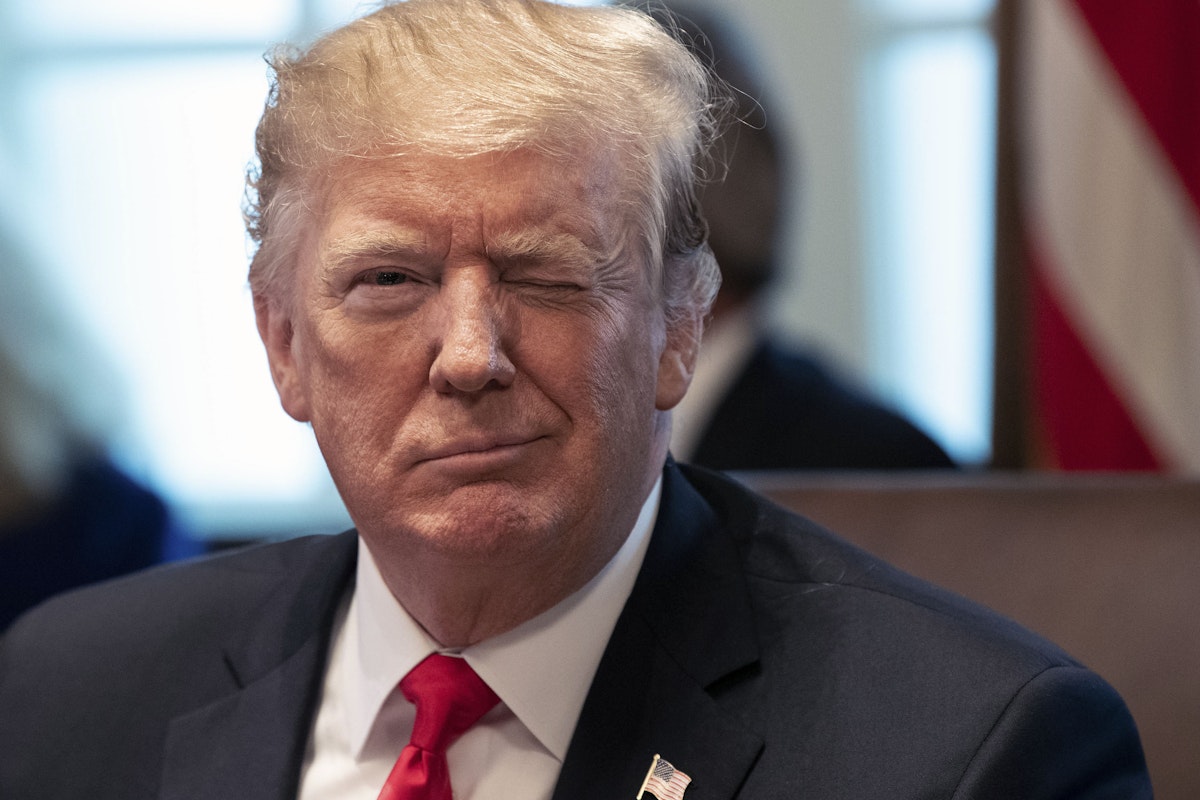The Billionaires Have Captured Donald Trump
One of the most enduring—and ridiculous—#Resistance narratives of the Trump era was the idea that the president of the United States was a literal Manchurian Candidate, a man who had been compromised for years (perhaps even decades) by a foreign power, namely Russia. Like most enduring conspiracy theories, this one was built on a kernel of truth. Donald Trump really was admiring of Vladimir Putin, and had no apparent problem with the Russian dictator arresting dissidents or invading neighbors. In fact, Trump really was far more conciliatory to Russia, a longstanding adversary, than he was to many of America’s closest allies. When Trump’s troubling admiration of Putin was combined with other details—particularly salacious (and dubious) reports of Trump, as a private citizen, being videotaped in Moscow, and salacious (and accurate) records of Trump doing business with shady Russian oligarchs—a conspiracy was born. Trump was compromised. Either through blackmail or bribery, America’s foreign policy was obviously being directed by Russia. Nearly a decade into Trump’s political career, there is no evidence that he is compromised by Putin or any other foreign power. But as he runs for reelection, Trump is indeed compromised in a way he never has been before. Desperate to avoid prison—and needing cash to win reelection, so he can pardon himself—Trump is selling his administration’s domestic and foreign policy to the highest bidder. It’s hardly a conspiracy, too. As we speak, he is traveling from billionaire to billionaire, with hat in hand, making explicit promises to sell his presidency. Trump has raked in campaign contributions in the wake of his conviction last week on 34 felony counts of falsifying business records—$60 million alone in the 24 hours after the jury delivered a guilty verdict, nearly half of his total $141 million haul in May. But even with that sizable pot, his campaign is still trailing Biden. And, given Trump’s use of campaign contributions to pay attorneys representing him in his numerous criminal trials, much of that money is being spent on legal rather than political expenses. For Trump, the 2024 presidential campaign is an existential project. If he wins, he surely will direct the Department of Justice to drop two ongoing criminal cases against him—one involving his retention of classified information after leaving office in 2021, another involving his role in the January 6 insurrection. He could, as president, also pardon himself and several key witnesses who might otherwise be tempted to testify against him to avoid jail time or reduce sentences. To keep those cases from advancing, and ultimately kill them, Trump needs to win the 2024 election. To do that, he needs money—lots of it. In recent weeks, one strategy for raising money has become clear: Trump is going to wealthy donors and interest groups and offering to cede policymaking to them—in exchange for massive campaign contributions. Last month, The Washington Post reported that Trump gathered oil executives at Mar-a-Lago and made a pitch: For the low cost of $1 billion, he would, as president “reverse dozens of President Biden’s environmental rules and policies and stop new ones from being enacted.” The pitch reportedly “stunned several of the executives in the room.” But it is nevertheless in keeping with Trump’s larger program. Despite promising during his first run for office in 2016 that he was, as a rich person, incorruptible—and that he would use his inside knowledge of a corrupt system to benefit his voters—Trump has always dispensed with subtlety and flaunted his corruption. Here, he is advertising his willingness to take a bribe: Give me what I want and I’ll give you what you want.And less than two weeks after that Post report, Trump made even more promises to oil and gas executives at a campaign fundraiser. He reportedly ended his speech by saying, “Be generous, please,” and was rewarded with more than $25 million in donations.That’s not all. In late May, an interesting item appeared in a New York magazine profile of billionaire casino magnate—and part owner of the NBA Finals-bound Dallas Mavericks—Miriam Adelson. Adelson, a longstanding donor to right-wing Republicans and a staunch supporter of Israel, is expected to be Trump’s largest donor in the 2024 cycle. But her money comes with strings attached. “One can assume she’ll press for the unfinished items of Trump’s Israel agenda from last term,” New York’s Elizabeth Weil wrote. “Top of that list: Israel annexing the West Bank and the U.S. recognizing its sovereignty there.” That would mark a dramatic shift in America’s policy toward Israel—and would make ending Israel’s destructive military campaign in Gaza significantly harder. But Trump is advertising that he’s open for business, and he has never shown any interest in Palestinian rights; it’s fair to assume he would see supporting annexation of the West Bank as a small price to pay for millions in campaign contributio

One of the most enduring—and ridiculous—#Resistance narratives of the Trump era was the idea that the president of the United States was a literal Manchurian Candidate, a man who had been compromised for years (perhaps even decades) by a foreign power, namely Russia.
Like most enduring conspiracy theories, this one was built on a kernel of truth. Donald Trump really was admiring of Vladimir Putin, and had no apparent problem with the Russian dictator arresting dissidents or invading neighbors. In fact, Trump really was far more conciliatory to Russia, a longstanding adversary, than he was to many of America’s closest allies.
When Trump’s troubling admiration of Putin was combined with other details—particularly salacious (and dubious) reports of Trump, as a private citizen, being videotaped in Moscow, and salacious (and accurate) records of Trump doing business with shady Russian oligarchs—a conspiracy was born. Trump was compromised. Either through blackmail or bribery, America’s foreign policy was obviously being directed by Russia.
Nearly a decade into Trump’s political career, there is no evidence that he is compromised by Putin or any other foreign power. But as he runs for reelection, Trump is indeed compromised in a way he never has been before. Desperate to avoid prison—and needing cash to win reelection, so he can pardon himself—Trump is selling his administration’s domestic and foreign policy to the highest bidder. It’s hardly a conspiracy, too. As we speak, he is traveling from billionaire to billionaire, with hat in hand, making explicit promises to sell his presidency.
Trump has raked in campaign contributions in the wake of his conviction last week on 34 felony counts of falsifying business records—$60 million alone in the 24 hours after the jury delivered a guilty verdict, nearly half of his total $141 million haul in May. But even with that sizable pot, his campaign is still trailing Biden. And, given Trump’s use of campaign contributions to pay attorneys representing him in his numerous criminal trials, much of that money is being spent on legal rather than political expenses.
For Trump, the 2024 presidential campaign is an existential project. If he wins, he surely will direct the Department of Justice to drop two ongoing criminal cases against him—one involving his retention of classified information after leaving office in 2021, another involving his role in the January 6 insurrection. He could, as president, also pardon himself and several key witnesses who might otherwise be tempted to testify against him to avoid jail time or reduce sentences. To keep those cases from advancing, and ultimately kill them, Trump needs to win the 2024 election. To do that, he needs money—lots of it.
In recent weeks, one strategy for raising money has become clear: Trump is going to wealthy donors and interest groups and offering to cede policymaking to them—in exchange for massive campaign contributions. Last month, The Washington Post reported that Trump gathered oil executives at Mar-a-Lago and made a pitch: For the low cost of $1 billion, he would, as president “reverse dozens of President Biden’s environmental rules and policies and stop new ones from being enacted.” The pitch reportedly “stunned several of the executives in the room.” But it is nevertheless in keeping with Trump’s larger program. Despite promising during his first run for office in 2016 that he was, as a rich person, incorruptible—and that he would use his inside knowledge of a corrupt system to benefit his voters—Trump has always dispensed with subtlety and flaunted his corruption. Here, he is advertising his willingness to take a bribe: Give me what I want and I’ll give you what you want.
And less than two weeks after that Post report, Trump made even more promises to oil and gas executives at a campaign fundraiser. He reportedly ended his speech by saying, “Be generous, please,” and was rewarded with more than $25 million in donations.
That’s not all. In late May, an interesting item appeared in a New York magazine profile of billionaire casino magnate—and part owner of the NBA Finals-bound Dallas Mavericks—Miriam Adelson. Adelson, a longstanding donor to right-wing Republicans and a staunch supporter of Israel, is expected to be Trump’s largest donor in the 2024 cycle. But her money comes with strings attached.
“One can assume she’ll press for the unfinished items of Trump’s Israel agenda from last term,” New York’s Elizabeth Weil wrote. “Top of that list: Israel annexing the West Bank and the U.S. recognizing its sovereignty there.” That would mark a dramatic shift in America’s policy toward Israel—and would make ending Israel’s destructive military campaign in Gaza significantly harder. But Trump is advertising that he’s open for business, and he has never shown any interest in Palestinian rights; it’s fair to assume he would see supporting annexation of the West Bank as a small price to pay for millions in campaign contributions. Last month, moreover, Trump promised donors that he would set back the pro-Palestinian movement by “25 or 30 years.” One easy way to do that: Allow Israel to annex the West Bank.
There’s little doubt that if Trump returns to the White House, he’ll again speak favorably of Putin and likely even support Russia’s annexation of Ukraine. But if so, it will be because Trump is fond of autocrats and disdains America’s alliances, rather than because Putin holds some kind of leverage over him. And yet, if Trump as president also does everything in his power to enrich the billionaire donors who have contributed so generously to his campaign, it will be hard to believe it’s because of a fondness for billionaires. Rather, he will simply be returning the favors that, for all the world to see, he promised them this year.



